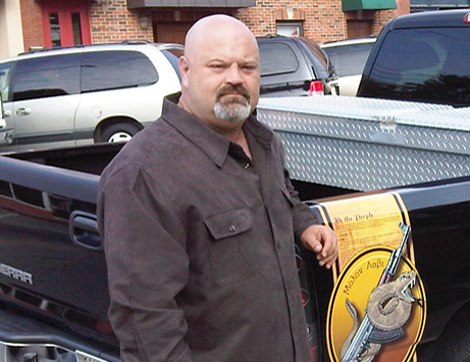
By Pat Shannan
A Tennessee jury deliberated 11 hours before convicting Georgia Militia Chaplain Darren Huff of “transporting in commerce a firearm intending to be used in furtherance of a civil disorder” (18 USC 231). Huff’s court-appointed defense attorney Scott Green said it was a charge that in 25 years of practice, “I have never before seen them use.” The jury acquitted Huff of the additional charge of “carrying firearms in relation to a crime of violence” (924(c)(1)(A).
Paralegal Mike Brown of Missouri, who has been assisting Huff, saw the verdict as the normal federal travesty of justice saying: “A conviction is merely the first step toward a successful appeal.”
Huff had faced a brutal onslaught by the national news media for 18 months and portrayed as a “gun nut” by reporters who typically took their story from government documents and spokesmen without ever interviewing the defendant. Nearly every publication carrying the story said he had traveled from Georgia to Tennessee to “take over the courthouse.” Huff and other defense witnesses called this allegation “ridiculous,” and their testimony from the witness stand seemed to show that it was more likely that government prosecutors had created a “thought crime” from words Huff may or may not have spoken.
The story began in March of 2009 when East Tennessee United States Attorney William Killian refused to act on the criminal charges of treason filed by Walt Fitzpatrick against sitting-President Barack Hussein Obama. Instead Killian sent the Secret Service to investigate Fitzpatrick as a “potential terrorist,” so the retired Naval 0fficer tried a different approach—that of getting the ear of his local grand jury in Madisonville, Tennessee.
During multiple failed attempts to be heard, Fitzpatrick discovered corruption and improprieties within the local court system particularly that of grand jury foreman Gary Pettway, who had been serving as (judge-appointed) foreman for 27 years while the Tennessee statutes limit service to “one term.” Fitzpatrick and others saw this as a decades-long control by judges to select who would be indicted and who would not.
Unable to get any legal cooperation after a year, Fitzpatrick attempted a citizen’s arrest on Pettway at the courthouse, and Huff witnessed and filmed the proceedings. Fitzpatrick was jailed and charged with multiple counts. His arraignment was set for April 20, 2010.
Planning to attend, Huff had a visit the night before from Federal Bureau of Investigation (FBI) agent Chuck Reed, who was assured that there were no plans for violence in the support of Fitzpatrick, but the next morning Huff was placed under surveillance and followed to Tennessee by the FBI.
This may have been the most important piece of information of all for the defense, because if Huff was guilty of what the prosecution later claimed, then why was he not arrested when crossing state lines instead of 10 days later?
The next morning, Huff and a friend left for Madisonville. He had a Colt .45 in a holster on his belt and an AK-47 in the toolbox of his pickup truck—a truck that was labeled in large letters: “OathKeepers,” a constitutionally-oriented group aimed at educating law officers, politicians and military personnel on the importance of the sworn oaths they all took to “defend and protect.”
Two hours later, a few miles from town, Huff was pulled over by Tennessee Highway Patrolman Michael Wilson for “failing to stop” at the bottom of the exit ramp. This later proved to be a contrived excuse when Wilson’s own Dash Cam video showed Huff stopping and then the immediate appearance of the FBI’s Task Force team. After more than an hour of peaceful confrontation, Huff was allowed to leave because his guns were legal, he carried a current permit and had broken no laws. He went home, but 10 days later, Huff was arrested by the FBI.
Pat Shannan is an AFP contributing editor and the author of several best-selling videos and books.

